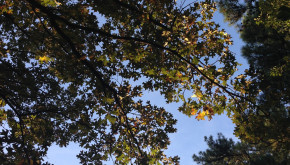
On a colorful fall weekend this past October, twenty-one women landowners headed out to Camp Susque in Trout Run, PA for the inaugural Women and Their Woods Educational Retreat. Most attendees hailed from Pennsylvania; some made the trip from New York and West Virginia.
Attendees were selected through an application process focused on women willing to attend the retreat to become mentors for other women landowners. The women bunked together, shared meals, and learned together. The weekend was full of dynamic and fun hands-on workshops and field trips. Presenters represented diverse organizations such as the PA Department of Conservation and Natural Resources (DCNR), Penn State University, USDA Forest Service, Oregon State University, and the PA Game Commission.
Many have asked, “Why the focus on women forest landowners?” There are some differences in how men and women forest landowners approach their land. From the 2007 USDA Ag Census, we know the number of women farmers and forest landowners nationwide increased 22% since 2002 (USDA Census of Agriculture, 2007). More and more women are becoming primary owners as they outlive spouses, inherit, or outright purchase forest land. A women-only analysis of data from the recent Penn State and PA DCNR Bureau of Forestry Private Forest Landowners survey showed how women forest landowners viewed their land and proposed to care for it.
Women forest landowners made up 17.8% of the respondents to the Private Forest Landowners survey. These women were more likely than men to own forest because it came with the property. They were less likely to own forest for hunting, growing trees for sale, using the woods for products, or income, which means the land has less of an economic value for these respondents than for their male counterparts. Men were more likely to undertake activities on their land, such as: improving wildlife habitat, cutting trees for sale, hunting, recreating, clearing trees for roads, controlling vegetation (either with herbicides or without), erecting a deer fence, or harvesting non-timber forest products – options which can improve the sustainability of forestland as well as generate potential economic return. More women responding to the survey indicated they were interested in a passive relationship with their land, tending to appreciate its aesthetic, recreational, and peace of mind values. Therefore, not surprisingly, in Pennsylvania, women forest landowners were less likely to seek out informational resources in caring for their land. The survey results showed that women are less likely to seek assistance from foresters, PA DCNR Bureau of Forestry personnel, or other landowners. This is an important finding because it suggests women forest landowners are at risk of making decisions that negatively impact the sustainability of their forest resource, supports the need to help women develop their understanding of management options for their properties, and to reach out to other women through peer to peer interactions.
The Women and Their Woods Educational Retreat grew out of the efforts of the Delaware Highlands Conservancy and the outreach of Penn State Cooperative Extension. In 2008, the Delaware Highlands Conservancy realized that due to demographic trends, increasing numbers of women are becoming the owners and managers of forest land. Because women landowners can feel they lack the knowledge to make informed decisions about land, the Conservancy, in partnership with the USDA Forest Service at Grey Towers, began offering educational programs for women forest landowners, and Women and Their Woods was born. With an increased interest in promoting educational opportunities for women forest landowners, the Conservancy and Penn State’s Natural Resources Extension, with funding from the PA Department of Conservation and Natural Resources and the USDA Forest Service, cooperated to offer outreach and education to women forest landowners across Pennsylvania. The momentum continues…
Post-retreat, the twenty-one participants are building on their experience and employing the knowledge they gained to increase education about the value of forest land and sound stewardship practices among other women forest landowners in their communities. Some are hosting field days on their properties; others are creating community groups of women forest landowners (and other women just interested in forestry) to promote learning; and others are reaching out through print and radio media.
The Delaware Conservancy and Penn State University will continue to provide educational outreach to the women mentors and support them in creating regional Women and Their Woods groups. Plans are underway to offer the second Women and Their Woods Educational Retreat this fall, September 27-30, 2012, again at Camp Susque in Lycoming County. Cost for participants will hold steady at $130 per person and scholarships are available. Applications for the 2012 retreat are available on our website. Visit the Extension webpage (http://extension.psu.edu/womenandtheirwoods) for more information. In the meantime, you can view photos of the retreat by visiting the Delaware Highlands Conservancy’s Facebook page and if you’d like to hear more about the last year’s retreat, listen online to Kara Holsopple’s NPR radio story at www.alleghenyfront.org; search Women and Their Woods.

